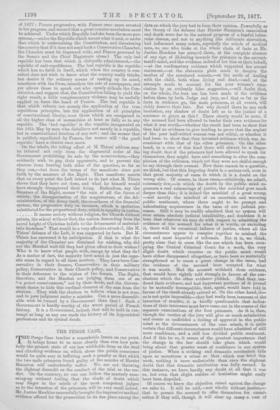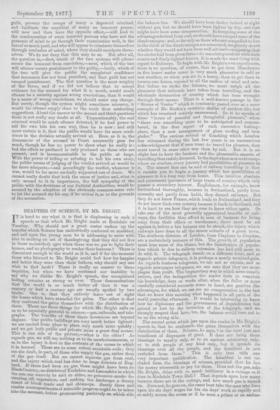THE PENGE CASE. T HE Penge Case teaches a remarkable lesson
on one point. It brings home to us more clearly than ever how pain- fully the present state of our law withholds from us the final and clinching evidence on, wliich alone the public conscience would be quite easy in inflicting such a penalty as that which the two male prisoners found guilty of the murder of Harriet Staunton will undoubtedly suffer. We are not throwing the slightest discredit on the conduct of the trial or the ver- dict. On the contrary, no one can follow the masterly sum- ming-up without feeling that the shade of doubt which may linger in the minds of the most competent judges as to the intention of the prisoners, will be very small indeed. Mr. Justice Hawkins successfully brought the impressive medical evidence offered for the prosecution to its due place among the data on which the jury had to form their opinion. Powerfully as the theory of the defence that Harriet Staunton's emaciation and death were due to the natural progress of a fearful tuber- cular disease, and not to anything like deliberate starvation, had influenced many minds, especially the minds of medical men, no one who looks at the whole chain of facts as Mr. Justice Hawkins has arrayed them, at the complete absence of any sign of ill-feeling towards the prisoners in the servant- maid's mind, and the evidence indeed of her bias on their behalf, —at the confirmatory evidence which supported her second statement,—at the elaborate plots made to deceive the mother of the murdered woman,—at the mode of dealing with the child, both when living and dead,—and at the attempts made to account for the poor woman's ema- ciation by an evidently false suggestion,—will doubt that, on the whole, the best use has been made of the evidence before them by both Judge and jury, and that so far as the facts in evidence go, the male prisoners, at all events, will richly deserve their fate. But why should there be any such hesitation, any shadow of doubt left as to the justice of a sentence so grave as this ? There clearly would be none, if the accused had been allowed to tender their own evidence for what it was worth,—whether the result had been to show that they had no evidence to give tending to prove that the neglect of the poor half-witted woman was not wilful, or whether it had been to show that they invented evidence which was in- consistent with that of the other prisoners. On the other hand, in a case of this kind there will always be a linger- ing doubt that if the prisoners had been allowed to speak for themselves, they might have said something to alter the com- plexion of the evidence, which yet they were not skilful enough to say through their counsel. Now there cannot be a question, we think, but that this lingering doubt is a serious evil, even in that great majority of cases in which it is a doubt on the wrong side. Of course, in those cases,—relatively, we admit, extremely few,—in which the doubt in the public mind re- presents a real miscarriage of justice, the mischief goes much deeper than this ; it is indeed the mischief of a great wrong, —not merely the mischief of an uncertain and wavering public sentiment, where there ought to be prompt and unhesitating acquiescence in the issue of our judicial pro- cesses. Still it may be readily admitted that no syatem will ever attain absolute judicial infallibility, and doubtless it is true that whatever we may do with respect to admitting the evidence of the accused for what it is worth, or excluding it, there will be occasional failures of justice, where all the circumstances appear to conspire together to mislead the best and most impartial of tribunals. But it is, we think, pretty clear that in cases like the one which has been occu- pying the Central Criminal Court for a week, the very slight doubt which remains on the public mind would have either disappeared altogether, or have been so materially strengthened as to cause a great change in the issue, had the evidence of the accused been accepted for what it was worth. Had the accused withheld their evidence, that would have rightly told strongly in favour of the con- clusions which the other evidence yielded. Had they ten- dered their evidence, and had important portions of it proved to be mutually incompatible, that, again, would have told in favour of the result already arrived at. On the other hand, if— as is not quite impossible—they had really been innocent of the intention of murder, it is hardly questionable that indica- tions of their innocence must have come out in the course of the separate examinations of the four prisoners. As it is, then, though the verdict of the jury will give as much satisfaction and create as undivided a feeling of approval in the public mind as the circumstances of the case admit, it is quite certain that different circumstances would have admitted of still more confidence, and a still less divided public sentiment. And if this be so, it seems of the greatest importance that the change in the law should take place which would bring about that greater sense of confidence in our system of justice. When a striking and dramatic retribution falls upon so monstrous a crime as that which was tried this week, nothing is more undesirable than even the slightest doubt that that dramatic retribution was fully earned. In this instance, we have hardly any doubt at all that it was so, but even that slight residue of hesitation might easily have been dispelled. Of course we know the objection raised against the change we refer to. It will be said,—not wholly without justice,— that to permit the accused to offer themselves for exami- nation if they will, though it will clear up many a case of guilt, prevent the escape of many a depraved criminal, and facilitate the acquittal of many an innocent person, will now and then have the opposite effect,—will lead to the condemnation of some innocent persons who have not the presence of mind to go through their examination well, in the face of so much peril, and who will appear to criminate themselves through confusion of mind, where they should exculpate them- selves. We do not deny that this may be so. But after all, the question is,—first, which of the two systems will oftener secure the innocent from conviction,—next, which of the two will oftener secure punishment to the guilly,—lastly, which of the two will give the public the completest confidence that innocence has not been punished, and that guilt has not escaped punishment. The first question is the most weighty of the three, and if we did not believe that to accept evidence for the accused for what it is worth, would much oftener be a security against wrong convictions, than it would be a cause of wrong convictions, we should resist any change. But surely, though the system might sometimes miscarry, it would far oftener supply clues to the truth than misleading suggestions. About the answer to the second and third questions there is not really any doubt at all. Unquestionably, the real criminal would be much oftener detected, if he had power to tell his own tale his own way, than he is now ; and still more certain is it, that the public would have far more confi- dence in the decision actually arrived at. Even as it is, the demeanour of the accused in Court necessarily goes for much, though he has no power to show what he really is ; but the effect so produced is only produced on those who are present, and is incommunicable to the public at large.
With the power of telling or refusing to tell his own story, the public means of judging of the verdict arrived at would be far more adequate,—and accordingly the verdict, whatever it was, would be far more cordially supported out of doors. We cannot really doubt that both the cause of justice and, what is only second to it in importance, the full sympathy of the public with the decisions of our Judicial Authorities, would be secured by the adoption of the obviously common-sense rule to let the accused say his say, if he wishes it, as to the grounds of the accusation.



































 Previous page
Previous page